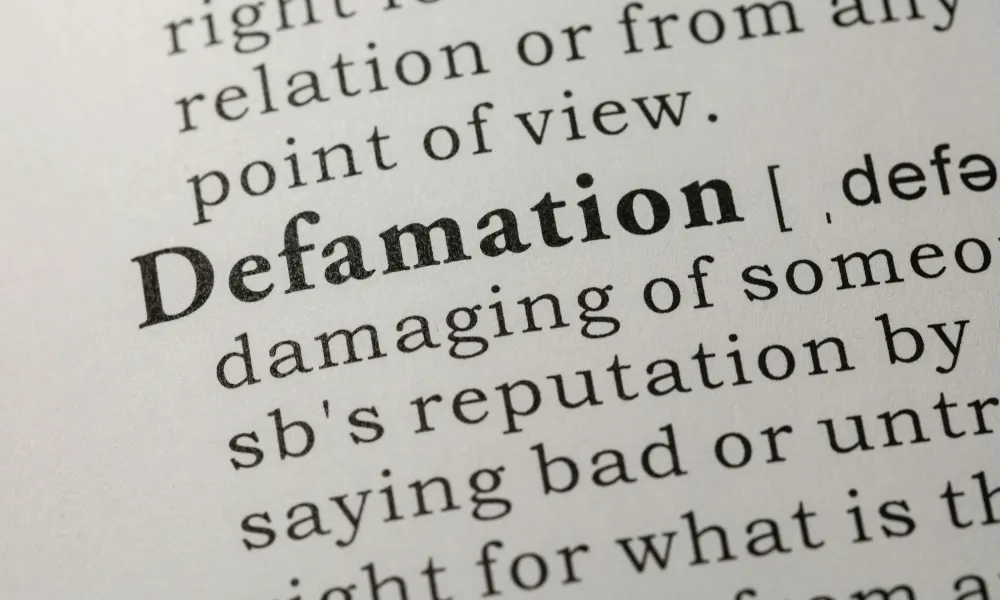A clear, real-world guide to what defamation really means, when it becomes a legal issue—and how one false statement can cause serious damage.
So, What Is Defamation?
Let’s say someone spreads a rumor about you—one that isn’t true. Maybe they claim you committed a crime, cheated a customer, or lied on your résumé. They post it online, or say it during a podcast. The next day, your phone blows up. Clients pull out. People whisper. Your reputation takes a hit you didn’t ask for.
That’s defamation. Plain and simple.
In the United States, defamation law exists to protect people from exactly this kind of damage. It gives you a legal way to fight back when someone makes a false statement about you that harms your personal or professional life.
Libel vs. Slander: Two Ways to Do the Same Damage
Both fall under the defamation umbrella, but they differ in how the harm is delivered:
Libel is written—social media posts, blogs, articles, even YouTube descriptions.
Slander is spoken—think conversations, interviews, livestreams, or speeches.
Libel is usually considered more serious in legal terms because the damage is easier to prove—it’s literally on record.
What Makes a Statement Legally Defamatory?
Not every insult or harsh comment qualifies. To count as defamation under U.S. law, four basic elements usually have to be in place:
The statement is false.
It’s shared as fact, not just opinion or satire.
It’s made public—or at least told to someone besides you.
It causes real harm, like damage to your reputation, income, or mental health.
“Defamation is a statement that injures a third party’s reputation. The tort of defamation includes both libel and slander.”— Legal Information Institute, Cornell Law School
If all four apply? You may have a case.
Some Claims Are So Damaging, the Law Assumes Harm
This is called defamation per se—and it includes things like:
Falsely accusing someone of a crime
Claiming they have a sexually transmitted or “shameful” disease
Making statements that could hurt their job or business
Publicly accusing them of immoral behavior, like cheating or fraud
In these cases, you don’t have to prove financial or emotional harm—the court assumes it.
If the claim doesn’t fall into one of those categories, it’s defamation per quod, and you’ll need to show how the lie hurt you.
Why It Matters Whether You’re a Public Figure or Private Citizen
Defamation law treats these two groups differently.
If you’re a private person—say, someone running a small business, or just living your life—you only need to prove the other person was negligent. That means they didn’t check their facts before saying something harmful.
But if you’re in the public eye—maybe you’re an athlete, actor, influencer, or politician—you’ve got a higher bar. You’ll need to show actual malice, meaning the person either knew the statement was false or didn’t care enough to check.
“The Supreme Court constitutionalized defamation law, underscoring the necessity for statements to be factual and not misleading.”— Professor Sharon A. Mattingly, Vanderbilt Law Review
This rule helps protect free speech in public debates—while still giving people a way to push back if they’re outright lied about.
Can’t I Just Say It Was My Opinion?
You can try—but that defense doesn’t always stick.
Saying, “I think she’s a terrible person” is likely fine. That’s opinion.
But saying, “She forged her accounting license” is different. That’s a statement of fact. If it’s false and you can’t prove it, that’s where defamation law comes in.
Courts look closely at how the statement was made—context, wording, tone. Just calling something “opinion” won’t protect you if a reasonable person would see it as a claim of fact.
Can You Really Get Sued Over a Tweet?
Absolutely.
These days, online defamation cases are on the rise. Tweets, Instagram posts, YouTube videos, even offhand comments on TikTok—if they contain false and damaging claims, they can land you in court.
And if the post goes viral? The stakes go way up.
“I provide expert opinion, testimony, and consulting in defamation of character cases, including both libel and slander (or portrayal in a false light).”— Nicholas Carroll, Defamation Consultant & Expert Witness
You’re responsible for what you say—even online.
What About Social Media Platforms? Are They Liable?
No, not usually.
Thanks to Section 230 of the Communications Decency Act, social platforms aren’t held legally responsible for what their users post. So, if someone posts a false claim about you on Facebook, you can sue the person who posted it—but not Facebook itself.
There’s ongoing debate about changing this law, but for now, that’s how it stands.
What Can You Win in a Defamation Lawsuit?
If the court sides with you, here’s what you might receive:
Compensatory damages – to cover things like lost income, anxiety, or therapy.
Punitive damages – for cases where the lie was especially nasty or reckless.
Presumed damages – if it’s defamation per se, the court may assume you were harmed.
Nominal damages – a symbolic amount if the impact was real but minor.
Some people also ask for a public apology or retraction—especially when the damage was done publicly.
What the Legal Process Looks Like
Here’s how these cases usually go:
Cease-and-desist letter – This is often the first step. It’s a formal notice asking the person to stop and take down the post or statement.
Filing the lawsuit – If they don’t respond or refuse, the next step is court.
Discovery – Both sides exchange evidence: emails, screenshots, messages, etc.
Motions – The defense may try to dismiss the case, especially if free speech is involved.
Settlement or trial – Many cases settle quietly before a court date.
In states with Anti-SLAPP laws, the court may throw out cases that seem designed to silence criticism, especially in matters of public interest.
Real-World Examples of Defamation & Libel
Defamation Case: Depp v. Heard (2022)
Type: Defamation (includes libel)Who: Johnny Depp vs. Amber HeardWhat Happened:In one of the most publicized defamation trials in recent memory, actor Johnny Depp sued ex-wife Amber Heard over an op-ed she wrote in The Washington Post, where she described herself as a victim of domestic abuse. Though Depp wasn’t named, he claimed the implication was clear and that it damaged his career and reputation.
Outcome:The jury sided mostly with Depp, awarding him over $10 million in damages. Heard also won a partial claim and was awarded $2 million. The trial reignited global debate over defamation, free speech, and reputation in the social media age.
This case showed how even indirect implications—when widely published—can qualify as defamation if harm can be proved.
Libel Case: New York Times Co. v. Sullivan (1964)
Type: Libel (written defamation)Who: L.B. Sullivan (public official) vs. The New York TimesWhat Happened:L.B. Sullivan, a public official in Alabama, sued The New York Times over an ad it published that contained some factual errors about the civil rights movement. Sullivan claimed it defamed him personally, even though he wasn’t named.
Outcome:The U.S. Supreme Court ruled in favor of The New York Times, establishing the “actual malice” standard for public figures in libel cases. This ruling became a cornerstone of U.S. defamation law and a major First Amendment victory.
It’s still one of the most cited libel decisions in American legal history and set the high bar public figures must meet to win defamation lawsuits.
People Also Ask
Can I sue someone for a false post about me?Yes. If what they said is false, presented as fact, and hurt your reputation, you may have a strong defamation case.
Is defamation a crime in the U.S.?No. It’s a civil issue. You sue for damages, not jail time.
Is a bad review defamation?Not if it’s honest opinion. But if it includes lies about your business—like saying you stole money or committed fraud—that might cross the line.
What counts as actual malice?It means the person either knew what they said was false or made the claim without caring if it was true.
Final Word: Watch What You Say—And What Gets Said About You
We live in a time when everyone has a platform. And with that power comes risk. One careless post, one exaggerated claim, one false accusation—it can all lead to legal fallout.
But if someone lies about you? The law gives you a way to fight back.
Whether you’re protecting your business, your career, or just your good name, defamation law is there to help draw the line between free speech and real harm.
📚 Further Reading on Defamation Cases
If you’re interested in how defamation plays out in real-life legal battles, here are some recent, high-profile cases worth exploring:


























